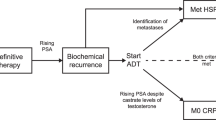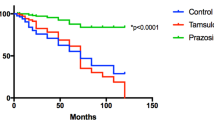Abstract
Purpose
Monoamine oxidase A (MAOA) influences prostate cancer growth and metastasis in pre-clinical models. We examined effects of phenelzine (a monoamine oxidase inhibitor) in patients with biochemical recurrent castrate-sensitive prostate cancer.
Materials and methods
An open-label single arm clinical trial enrolled subjects with biochemical recurrent prostate cancer defined by PSA ≥ 0.4 ng/ml (post prostatectomy) or PSA ≥ 2 ng/ml above nadir (post-radiation therapy); no evidence of metastasis on imaging; and normal androgen levels. Subjects received phenelzine 30 mg orally twice daily. Mood symptoms were assessed with the hospital anxiety depression score (HADS) questionnaire. The primary endpoint was the proportion of patients who achieved a PSA decline of ≥50% from baseline.
Results
Characteristics of the 20 eligible patients enrolled included: mean ± SD age 66.9 ± 4.8 years and PSA 4.7 ± 5.8 ng/dl. Maximal PSA declines ≥30% and ≥50% were observed in 25% (n = 5/20) and 10% (n = 2/20) of subjects, respectively. At 12 weeks, 17 subjects remained on treatment with PSA declines ≥30% and ≥50% of 24% (n = 4/17) and 6% (n = 1/17), respectively. Common toxicities observed included dizziness (grade 1 = 45%, grade 2 = 35%), hypertension (grade ≥ 2 = 30%), and edema (grade 1 = 25%, grade 2 = 10%). There was one episode of grade 4 hypertension (cycle 4) and two episodes of grade 3 syncope (cycle 12 and cycle 14) requiring treatment discontinuation. HADS questionnaires demonstrated a significant decrease in anxiety with no change in depressive symptoms on treatment.
Conclusions
Phenelzine demonstrated efficacy in patients with biochemical recurrent castrate-sensitive prostate cancer. Most treatment-related toxicities were mild, but rare significant and reversible cardiovascular toxicities were observed. Therapies directed at MAOA may represent a new avenue for treatment in patients with recurrent prostate cancer.
This is a preview of subscription content, access via your institution
Access options
Subscribe to this journal
Receive 4 print issues and online access
$259.00 per year
only $64.75 per issue
Buy this article
- Purchase on Springer Link
- Instant access to full article PDF
Prices may be subject to local taxes which are calculated during checkout



Similar content being viewed by others
Data availability
The datasets used and/or analyzed during the current study are available from the corresponding author upon request.
References
Siegel RL, Miller KD, Jemal A. Cancer statistics, 2019. CA Cancer J Clin. 2019;69:7–34.
Shipley WU, Thames HD, Sandler HM, Hanks GE, Zietman AL, Perez CA, et al. Radiation therapy for clinically localized prostate cancer: a multi-institutional pooled analysis. JAMA. 1999;281:1598–604.
Roehl KA, Han M, Ramos CG, Antenor JA, Catalona WJ. Cancer progression and survival rates following anatomical radical retropubic prostatectomy in 3,478 consecutive patients: long-term results. J Urol. 2004;172:910–4.
Scher HI, Heller G. Clinical states in prostate cancer: toward a dynamic model of disease progression. Urology. 2000;55:323–7.
Gandaglia G, Briganti A, Clarke N, Karnes RJ, Graefen M, Ost P, et al. Adjuvant and salvage radiotherapy after radical prostatectomy in prostate cancer patients. Eur Urol. 2017;72:689–709.
Paller CJ, Antonarakis ES, Eisenberger MA, Carducci MA. Management of patients with biochemical recurrence after local therapy for prostate cancer. Hematol Oncol Clin North Am. 2013;27:1205–19.
Pound CR, Partin AW, Eisenberger MA, Chan DW, Pearson JD, Walsh PC. Natural history of progression after PSA elevation following radical prostatectomy. JAMA. 1999;281:1591–7.
Antonarakis ES, Feng Z, Trock BJ, Humphreys EB, Carducci MA, Partin AW, et al. The natural history of metastatic progression in men with prostate-specific antigen recurrence after radical prostatectomy: long-term follow-up. BJU Int. 2012;109:32–9.
Teply BA, Wang H, Luber B, Sullivan R, Rifkind I, Bruns A, et al. Bipolar androgen therapy in men with metastatic castration-resistant prostate cancer after progression on enzalutamide: an open-label, phase 2, multicohort study. Lancet Oncol. 2018;19:76–86.
Ou XM, Chen K, Shih JC. Glucocorticoid and androgen activation of monoamine oxidase A is regulated differently by R1 and Sp1. J Biol Chem. 2006;281:21512–25.
Zhao H, Nolley R, Chen Z, Reese SW, Peehl DM. Inhibition of monoamine oxidase A promotes secretory differentiation in basal prostatic epithelial cells. Differentiation. 2008;76:820–30.
True L, Coleman I, Hawley S, Huang CY, Gifford D, Coleman R, et al. A molecular correlate to the Gleason grading system for prostate adenocarcinoma. Proc Natl Acad Sci USA. 2006;103:10991–6.
Liao CP, Lin TP, Li PC, Geary LA, Chen K, Vaikari VP, et al. Loss of MAOA in epithelia inhibits adenocarcinoma development, cell proliferation and cancer stem cells in prostate. Oncogene. 2018;37:5175–90.
Gaur S, Gross ME, Liao CP, Qian B, Shih JC. Effect of Monoamine oxidase A (MAOA) inhibitors on androgen-sensitive and castration-resistant prostate cancer cells. Prostate. 2019;79:667–77.
Wu JB, Shao C, Li X, Li Q, Hu P, Shi C, et al. Monoamine oxidase A mediates prostate tumorigenesis and cancer metastasis. J Clin Invest. 2014;124:2891–908.
Wimbiscus M, Kostenko O, Malone D. MAO inhibitors: risks, benefits, and lore. Cleve Clin J Med. 2010;77:859–82.
Gillman PK, Feinberg SS, Fochtmann LJ. Revitalizing monoamine oxidase inhibitors: a call for action. CNS Spectr. 2019:1–3. https://doi.org/10.1017/S1092852919001196. PMID: 31272520.
Stephenson AJ, Kattan MW, Eastham JA, Dotan ZA, Bianco FJ Jr, Lilja H, et al. Defining biochemical recurrence of prostate cancer after radical prostatectomy: a proposal for a standardized definition. J Clin Oncol. 2006;24:3973–8.
Roach M III, Hanks G, Thames H Jr, Schellhammer P, Shipley WU, Sokol GH, et al. Defining biochemical failure following radiotherapy with or without hormonal therapy in men with clinically localized prostate cancer: recommendations of the RTOG-ASTRO Phoenix Consensus Conference. Int J Radiat Oncol Biol Phys. 2006;65:965–74.
Simon R. Optimal two-stage designs for phase II clinical trials. Control Clin Trials. 1989;10:1–10.
Zigmond AS, Snaith RP. The hospital anxiety and depression scale. Acta Psychiatr Scand. 1983;67:361–70.
Parke-Davis DoPI. Nardil (Phenelzine Sulfate) package insert. New York, NY 10017.
Mitchell AJ, Meader N, Symonds P. Diagnostic validity of the hospital anxiety and depression scale (HADS) in cancer and palliative settings: a meta-analysis. J Affect Disord. 2010;126:335–48.
Youdim MB, Edmondson D, Tipton KF. The therapeutic potential of monoamine oxidase inhibitors. Nat Rev Neurosci. 2006;7:295–309.
Birkenhäger TK, van den Broek WW, Mulder PG, Bruijn JA, Moleman P. Efficacy and tolerability of tranylcypromine versus phenelzine: a double-blind study in antidepressant-refractory depressed inpatients. J Clin Psychiatry. 2004;65:1505–10.
Lofters A, Juffs HG, Pond GR, Tannock IF. “PSA-itis”: knowledge of serum prostate specific antigen and other causes of anxiety in men with metaststic prostate cancer. J Urol. 2002;168:2516–20.
Dale W, Bilir P, Han M, Meltzer D. The role of anxiety in prostate carcinoma: a structured review of the literature. Cancer. 2005;104:467–78.
Acknowledgements
Presented in part at the Prostate Cancer Foundation Annual Scientific Retreat October 2016. We thank Mayada Aljehani for statistical analysis and the nurses and research staff at the Ellison Institute for Transformative Medicine of USC, LAC + USC Medical Center and the USC Norris Comprehensive Cancer Center who contributed to this trial.
Funding
USC-Taiwan Center for Translational Research supported by Tsai Family Fund to Jean C. Shih. This work was partially supported by National Cancer Institute Cancer Center Shared Grant award P30CA014089. The content is solely the responsibility of the authors and does not necessarily represent the official views of the National Cancer Institute or the National Institutes of Health. None of the funding sources influenced the design, analysis, or conclusions of the study.
Author information
Authors and Affiliations
Contributions
MEG and JCS were responsible for trial conception and design. MEG, DBA, TD, JP, and DQ were involved in study conduct including patient enrollment, treatment, and data collection. MEG, OC, and PG assembled the data. MEG analyzed the data and drafted the report. All authors critically reviewed the manuscript and approved the final manuscript.
Corresponding authors
Ethics declarations
Ethics approval and consent to participate
The clinical research protocol was approved by the Institutional Review Board (IRB) at the University of Southern California (USC), Los Angeles, California. All patients gave prospective consent to participate in all study procedures.
Conflict of interest
MEG serves as a consultant for Amgen and BeiGene and receives institutional research funding from Clovis Oncology, Glaxo-Smith-Kline, and BeiGene. TBD serves as a consultant for Bayer, Noxopharm, Roche, and Seattle Genetics, is a speaker for Exelixis, and receives institutional research funding from Bayer. DIQ serves as a consultant for Astellas, AstraZeneca, Bayer, Genzyme-Sanofi, Jannsen, Clovis and Pfizer. JCS has a patent entitled Monoamine oxidase inhibitors and methods for treatment and diagnosis of prostate cancer. US Patent No. 9.771,625. The other authors declare no conflicts of interest.
Additional information
Publisher’s note Springer Nature remains neutral with regard to jurisdictional claims in published maps and institutional affiliations.
Supplementary information
Rights and permissions
About this article
Cite this article
Gross, M.E., Agus, D.B., Dorff, T.B. et al. Phase 2 trial of monoamine oxidase inhibitor phenelzine in biochemical recurrent prostate cancer. Prostate Cancer Prostatic Dis 24, 61–68 (2021). https://doi.org/10.1038/s41391-020-0211-9
Received:
Revised:
Accepted:
Published:
Issue Date:
DOI: https://doi.org/10.1038/s41391-020-0211-9
This article is cited by
-
New advances of the androgen receptor in prostate cancer: report from the 1st International Androgen Receptor Symposium
Journal of Translational Medicine (2024)
-
Monoamine oxidase inhibition properties of 2,1-benzisoxazole derivatives
Molecular Diversity (2023)
-
Antidepressant medication use and prostate cancer recurrence in men with depressive disorders
Cancer Causes & Control (2022)
-
Targeting monoamine oxidase A-regulated tumor-associated macrophage polarization for cancer immunotherapy
Nature Communications (2021)
-
Monoamine Oxidase Inhibitors (MAOIs) in Psychiatric Practice: How to Use them Safely and Effectively
CNS Drugs (2021)



